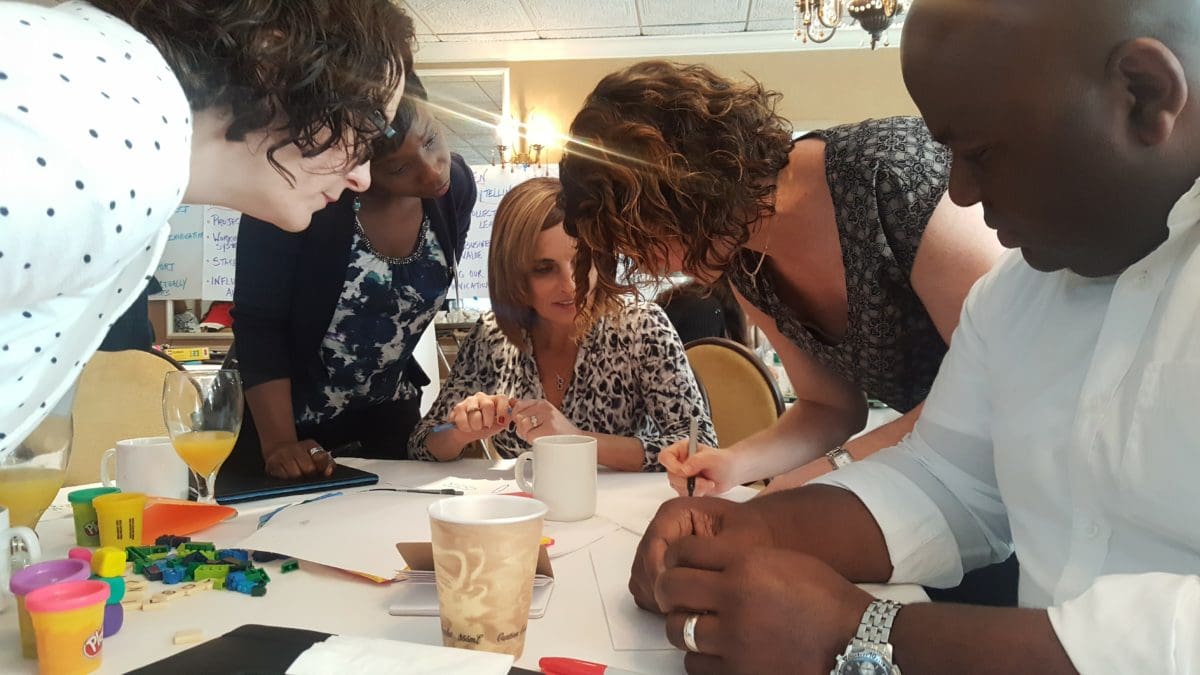This post was originally published by The Rockefeller Foundation.
A couple of weeks ago, influential employers—including T-Mobile, Gap Inc., and McDonalds*—came to New Orleans for an unprecedented gathering on jobs in the United States. Each had expressed enthusiasm for impact hiring—an approach that creates business value through hiring and investing in individuals who face barriers to economic opportunity. Through a cohort-based program designed and led by FSG, and supported by The Rockefeller Foundation and Walmart, employers began putting this enthusiasm into action in new ways.
The inaugural impact hiring cohort brings together HR, Operations, and corporate social responsibility leaders from diverse employers to design new ways for their companies to support entry-level talent, including opportunity youth—16- to 24-year-olds who are neither working nor in school. Over the course of 9 months, participants will collaborate in design thinking workshops, engage with youth and community leaders, and develop and evaluate pilot projects at their companies to provide greater opportunity and improve retention for this target audience. Amidst the sights, sounds, and culture of New Orleans, employers began their journey and started to create their own “jazz” around social change and business value.
This cohort-based approach, designed to accelerate adoption of impact hiring practices, is an important catalyst to create more inclusive economies by engaging employers in developing new ideas and solutions. Over the past decade, The Rockefeller Foundation has worked with the private sector to unlock the solutions to some of society’s biggest problems—particularly relating to livelihoods – in the United States and around the world. FSG has seen the importance of finding business opportunities that help solve social problems through both our stewardship of the Shared Value Initiative and our consulting work. Supporting a cohort of pioneering companies focused on impact hiring, in partnership with other funders and experts, is an investment both of our organizations believe in.
In working together, we have learned 3 key lessons about employer engagement that we are applying to this cohort learning model:
1. Create a strong business case
While many employers want to “do well by doing good,” far fewer are able to demonstrate the business value of their investment in society. To help build the business case for impact hiring, FSG’s consulting team deeply researched impact hiring best practices. They shared their learnings in a recent report: “Investing in Entry-Level Talent: Retention Strategies that Work.” It includes dozens of examples of impact hiring initiatives with a clear business case, which were used by the companies in New Orleans as they considered how they might demonstrate the ROI of their impact hiring investments. We believe these investments in research and data are critical, because even the most socially-minded employers have shareholders looking at their bottom line.
2. Facilitate peer-to-peer learning
The experience in New Orleans was impactful for business leaders because it allowed them to build intra-company relationships. We hope strengthening this ecosystem of champions will build courage to not only experiment, but share their best practices more widely with the business and social sectors. It is much easier to be courageous when you have a community of peers who understand your challenges and are standing with you, and we saw that start to happen in New Orleans. The first evening of the gathering, one participant exclaimed that if he didn’t get anything else out of the 3 days, the networking and ideas he received in the first few hours was worth the trip.
3. Equip the right champions
In our experience, empowering and equipping multiple internal champions with tools, resources, and inter-personal support is a key part of sustaining change. Many of the businesses we seek to engage are large enough that they operate as complex systems. Change can be challenging for those working within that system, even with authority. Equipping the right champions, or “intrapreneurs,” within pioneering businesses is a critical part of this work. These champions don’t always need to be in the C-suite, but they must have significant influence and decision-making authority. Often, those who have lived experience overcoming their own barriers have been able to steer their companies to be more inclusive—but they need more allies and partners in this work.
Megan Hansen, Vice President of People at MOD Pizza shared, “By participating in this effort we’ve learned that we all have similar aspirations—and face similar challenges—when it comes to creating meaningful work for populations that have traditionally struggled.” She explained that this was a turning point for her own work. “This is an inspiring cohort, and by coming together I think we’re empowering one another to work collectively in order to create lasting and positive change at our companies and beyond.”
We look forward to working together to equip more champions and pioneering companies across the private sector by widely sharing the lessons and stories of the companies in the first cohort and by involving a second cohort of companies in a similar setting starting October, 2017 so that our collective work can create the most meaningful and replicable impacts.
*Participating employers include: T-Mobile, McDonalds, Walmart, ESL Credit Union, Nordstrom, HMS Host, and Mod Pizza, with Gap Inc. and Chipotle participating as advisors.

